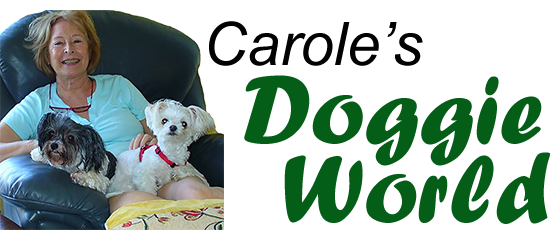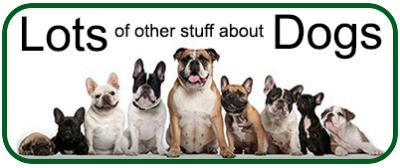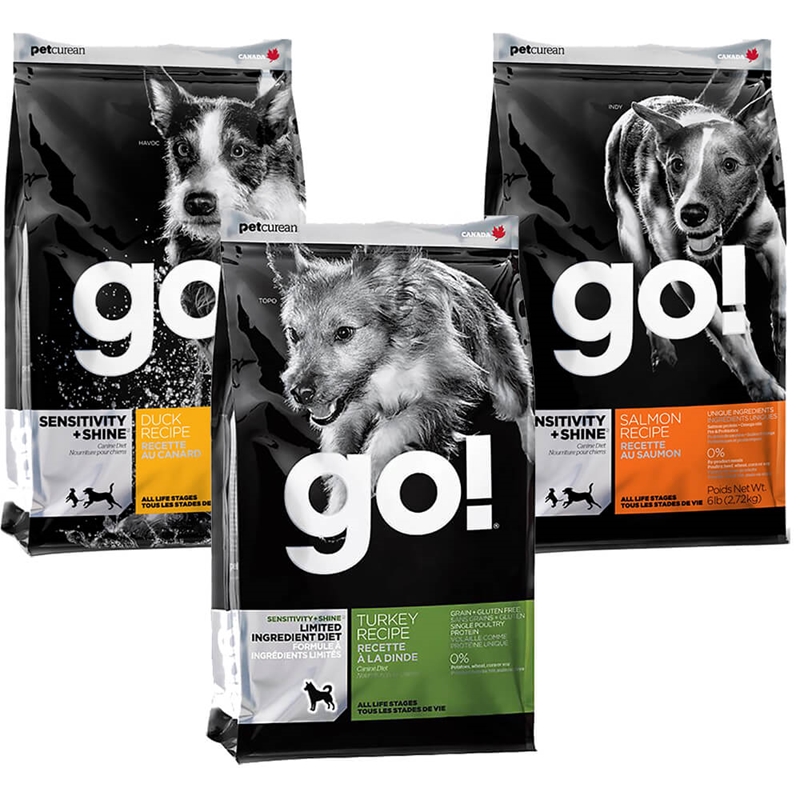Important symptoms you need to know about Hypothyroidism and your dog
Hypothyroidism and its causes | Hypothyroidism symptoms
Early symptoms | What to ask for | Treatment options | Natural solutions
Immune dysfunction | Canine breeds most prone to hypothyroidism
If your normally sweet natured dog has suddenly become snappy or even unexpectedly aggressive, you naturally wonder what’s going on.
So, you take your dog to your family vet to rule out any illness or injury. Your vet does a physical exam and can’t find anything that might be causing pain or discomfort, and suggests putting your furry friend on anti-anxiety medication to see if that helps.
Remember you know your dog better than anyone else, and if after watching the above video you feel there must be another reason for your dog’s behavior change . . . and you’re probably right, then go right ahead and ask your vet to please test your dog for hypothyroidism.
Hypothyroidism and its causes
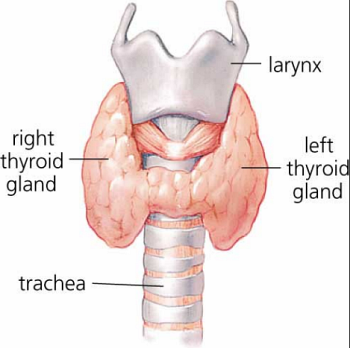
The thyroid gland is a butterfly shaped gland in the neck which regulates the metabolism of your dog’s cellular functions by producing hormones such as thyroxine (T4). Hypothyroidism occurs when the thyroid doesn’t produce enough T4.
Dr. Jean Dodds and Dr Marty Goldstein are two leading veterinary experts in the USA in thyroid issues.
Dr. Dodds states that in nearly 90 percent of cases hypothyroidism is an autoimmune disorder.
Dr Marty Goldstein states that autoimmune thyroiditis happens when the body mistakenly interprets its own thyroid gland and hormones as foreign threats. The body then produces antibodies to destroy the functional thyroid gland cells, resulting in loss of function.
Although some breeds are genetically predisposed towards hypothyroidism, Dr Goldstein says the following environmental factors also play a role as triggers for autoimmune reactions:
- Chemicals in medicines
- Flea and tick products, heartworm drugs
- Vaccines
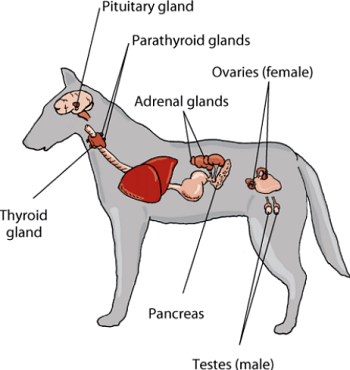
Dr. Goldstein also describes secondary hypothyroidism, which involves three glands that work in conjunction with each other:
- The thyroid gland
- The hypothalamus
- The pituitary gland
The pituitary gland secretes TSH (thyroid stimulating hormone) that stimulates the thyroid to function.
But the pituitary gland gets its “orders” from hormones released by the hypothalamus so these three glands can’t work properly without proper input from the others; the thyroid might be normal, but is not receiving the messages it needs to function.
Dr Dodds warns that a tight or prong collar on a dog who pulls a lot can also cause extensive thyroid damage so using a harness will avoid injury when walking him.
Hypothyroidism symptoms
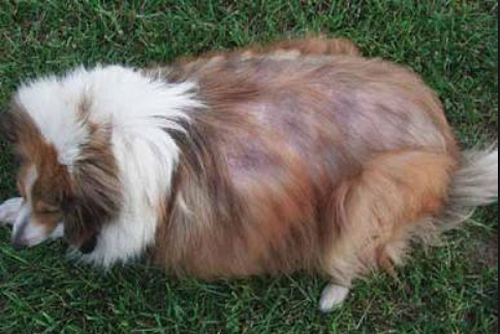
The classic symptoms of hypothyroidism are familiar to many:
- Weight gain
- Sluggishness
- Bad skin
- Hair loss
- Cold intolerance
If we saw these symptoms, we’d probably think about getting our dog’s thyroid tested. These are the symptoms veterinarians are trained to look for too.
But according to Dr Jean Dodds, these classic clinical symptoms don’t occur until 70 percent of the thyroid is already damaged! And once the thyroid is damaged, it doesn’t regenerate. So, instead of waiting for these symptoms to appear, it’s really important to recognize the early symptoms that may indicate a damaged thyroid.
Early symptoms
So, getting back to the grumpy dog we talked about at the beginning of the article … it turns out that a key early symptom of thyroid damage is – guess what – behavioral problems!
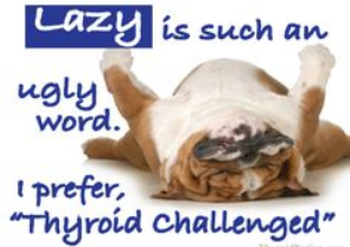
Adult dogs who suddenly start snapping are a good example of the kind of change you might observe. Your dog might start being fearful out of the blue, or displaying aggression. You might see submissive or obsessive compulsive behaviors.
Dogs who gain weight when they’re not being overfed (known as idiopathic obesity) are also displaying early symptoms of thyroid damage.
You might also see changes in your dog’s face. The eyes may look different, the brow can look furrowed, or you may even see a cleft above the eyes. Dr Dodds recommends taking regular photos of your dog so you can see the changes that take place!
So if you see a sudden behavior change in your dog, perhaps along with some weight gain without any change in diet, it’s a very good idea to have your dog’s thyroid tested.
In many cases humans and dogs suffer similar symptoms and diseases. If after reading the above paragraphs you feel some of the symptoms apply to yourself you can always ask your doctor to run a test for Hypothyroidism.
Keep updated with all that's
right for your best friend!
click on this link
to subscribe to our free mailing list.
What to ask for
The right kind of testing is important when diagnosing hypothyroidism. Be careful! Many vets will just test the T4 level and diagnose based on that alone.
Both Dr Dodds and Dr Goldstein warn that the T4 test alone is useless because it can be affected by many other factors such as diet and medications. Diagnosis should never be based on T4 alone.
Instead, make sure you get a complete thyroid antibody profile, measuring at least T3, T4, Free T3, Free T4, and TgAA. If your vet doesn’t offer a full thyroid profile, ask her to draw the blood for you and send it yourself to Hemopet (Dr Dodds’ diagnostic laboratory – visit hemopet.org for more information) or another lab that offers this testing.
Treatment options
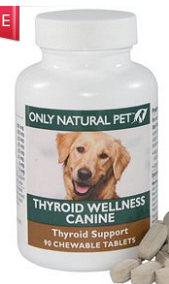
If your dog is diagnosed with hypothyroidism, there are many natural therapies that may help before resorting to conventional synthetic thyroid replacement.
Be sure to consult a holistic vet about the following therapies which can support your dog’s thyroid function:
- Dietary and nutritional
- Nutraceutical
- Glandular therapies
Natural solutions
The reality is nothing about hypothyroidism is simple. And while conventional veterinary medicine is quick to jump on synthetic thyroid hormone replacement for lifelong treatment, many of us want more natural treatment options.
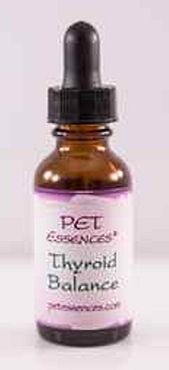
Certified Veterinary Homeopath Dr Jeff Feinman offers one alternative by way of homeopathy, a form of treatment developed at the end of 18th century Germany based on the concept of “like cures like” – meaning a substance normally causing a particular illness in a healthy person or animal can cure someone who is sick with that illness. The substance, which can come from a plant, mineral or animal, is usually highly diluted.
“Homeopathy back in the 1800s was on its way to being the foremost medicine,” Dr Feinman says. “It’s the way everything should be treated, in my book”.
Dr Feinman goes on to say, homeopathy, aims to cure by stimulating the body to heal itself; he categorizes treating disease into three different approaches:
- Cure (it goes away without further treatment being necessary)
- Palliatiation (requiring repeated, lifelong treatment)
- Suppression of the disease
“We’re getting the body to do all the work,” he says. “We’re just giving it the template to do it".
Immune dysfunction
Hypothyroidism presents a particular challenge since in many cases the disease is caused by a basic dysfunction in the immune system. In up to 80% of cases, the disease is caused by autoimmune destruction of the thyroid gland (autoimmune thyroiditis), according to thyroid expert and veterinarian Dr W Jean Dodds. According to Dodds, the remaining 15 to 20% of hypothyroid cases in dogs are typically familial (run in the family) and are due to idiopathic thyroid atrophy, meaning that the thyroid gland is progressively destroyed by an unknown cause.
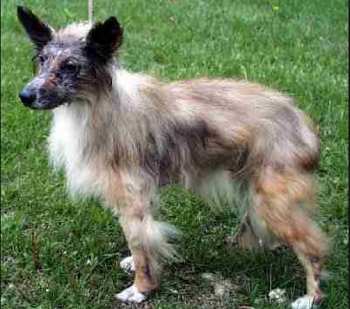
While the homeopathic approach is to minimize and eventually cure the autoimmune thyroiditis, Dr Feinman says whatever is causing the negative thyroid loop and destruction of the thyroid must first be stopped.
If the thyroid is destroyed and the body cannot produce enough hormones to heal itself, then homeopathy can’t stimulate the body to cure itself.
In order to get to the bottom of things, the homeopath must look at the dog’s entire history and symptoms and select a homeopathic medicine based on the individual. Dr. Feinman estimates there are more than 60 homeopathic medicines that are associated with hypothyroidism treatment.
“It really is individual,” says Dr. Feinman e.g. “One medicine that we treat one animal with may have nothing to do with what another dog has”.
In the website holisticvetpetcare.com, the late holistic veterinarian Dr Gloria Dodd attributed much of the disruption of the endocrine gland balance (including thyroid, pituitary, adrenal and sex endocrine glands) to environmental factors including:
Chemicals like pesticides
- Chemicals like pesticides
- Water and food pollutants
- Flea, tick and heart worm preventatives
- Vaccines
- Steroids
- Non-beneficial energy fields in the home from electrical appliances, cell phones etc
Her hypothyroidism treatment protocol includes:
- Use of natural glandular thyroid extracts
- Homeopathic remedies
- Detoxification
- Diet changes
- Cleaning of energy fields in the home
Dr Marty Goldstein, renowned pioneer of holistic and integrative veterinary medicine, takes a nutraceutical approach to hypothyroidism. Smith Ridge Veterinary Hospital in New York state where Dr Goldstein is medical director uses the Nutritional Blood Test to analyze a dog's blood for signs of metabolic weaknesses and then develop a customised, powdered blend of vitamins, minerals, nutrients, and glandulars to feed the pet.
“The goal of nutraceutical therapy is to restore cellular health throughout the body,” says Dr Goldstein. “When cellular function becomes optimal, improved health follows".
Canine breeds most prone to hypothyroidism
Any dog-including mixed breeds-can suffer from primary hypothyroidism, but the ten breeds most susceptible include:
- Boxers
- Cocker Spaniels
- Dachshunds
- Doberman Pinschers
- English Bulldogs
- Golden Retrievers
- Great Danes
- Greyhounds
- Labrador Retrievers
This article and information forms part of the Carole's Doggie World Holistic Library and is presented for informational purposes only.The information is not intended to be a substitute for visits to your local vet. Instead, the content offers the reader information researched and written by Carole Curtis for www.carolesdoggieworld.com
